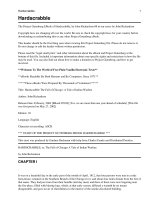For the Temple A Tale of the Fall of Jerusalem ppt
Bạn đang xem bản rút gọn của tài liệu. Xem và tải ngay bản đầy đủ của tài liệu tại đây (695.07 KB, 207 trang )
Chapter 1
Chapter 2
Chapter 3
Chapter 4
Chapter 5
Chapter 6
Chapter 7
Chapter 8
Chapter 9
Chapter 10
Chapter 11
Chapter 12
Chapter 13
Chapter 14
Chapter 15
Chapter 16
Chapter 17
Chapter 18
Chapter 19
Chapter 1
Chapter 2
Chapter 3
Chapter 4
Chapter 5
Chapter 6
Chapter 7
Chapter 8
Chapter 9
Chapter 10
Chapter 11
1
Chapter 12
Chapter 13
Chapter 14
Chapter 15
Chapter 16
Chapter 17
Chapter 18
Chapter 19
For the Temple, by G. A. Henty
The Project Gutenberg EBook of For the Temple, by G. A. Henty This eBook is for the use of anyone
anywhere at no cost and with almost no restrictions whatsoever. You may copy it, give it away or re-use it
under the terms of the Project Gutenberg License included with this eBook or online at www.gutenberg.org
Title: For the Temple A Tale of the Fall of Jerusalem
Author: G. A. Henty
Release Date: May 26, 2007 [EBook #21614]
Language: English
Character set encoding: ASCII
*** START OF THIS PROJECT GUTENBERG EBOOK FOR THE TEMPLE ***
Produced by Martin Robb.
For the Temple: A Tale of the Fall of Jerusalem By G. A. Henty.
Contents
Preface.
For the Temple, by G. A. Henty 2
Chapter 1
: The Lake Of Tiberias.
Chapter 1 3
Chapter 2
: A Storm On Galilee.
Chapter 2 4
Chapter 3
: The Revolt Against Rome.
Chapter 3 5
Chapter 4
: The Lull Before The Storm.
Chapter 4 6
Chapter 5
: The Siege Of Jotapata.
Chapter 5 7
Chapter 6
: The Fall Of The City.
Chapter 6 8
Chapter 7
: The Massacre On The Lake.
Chapter 7 9
Chapter 8
: Among The Mountains.
Chapter 8 10
Chapter 9
: The Storming Of Gamala.
Chapter 9 11
Chapter 10
: Captives.
Chapter 10 12
Chapter 11
: A Tale Of Civil Strife.
Chapter 11 13
Chapter 12
: Desultory Fighting.
Chapter 12 14
Chapter 13
: The Test Of Devotion.
Chapter 13 15
Chapter 14
: Jerusalem.
Chapter 14 16
Chapter 15
: The Siege Is Begun.
Chapter 15 17
Chapter 16
: The Subterranean Passage.
Chapter 16 18
Chapter 17
: The Capture Of The Temple.
Chapter 17 19
Chapter 18
: Slaves.
Chapter 18 20
Chapter 19
: At Rome.
Illustrations
On the Sea of Galilee. Heightening the Walls of Jotapata under Shelter of Ox Hides. John Incites his
Countrymen to Harass the Romans. The Roman Camp Surprised and Set on Fire. Mary and the Hebrew
Women in the Hands of the Romans. Titus Brings Josephus to See John. John and his Band in Sight of
Jerusalem. Misery in Jerusalem During the Siege by Titus. 'Lesbia,' the Roman said, 'I have brought you two
more slaves.' The Return of John to his House on the Lake.
Preface.
In all history, there is no drama of more terrible interest than that which terminated with the total destruction
of Jerusalem. Had the whole Jewish nation joined in the desperate resistance made, by a section of it, to the
overwhelming strength of Rome, the world would have had no record of truer patriotism than that displayed,
by this small people, in their resistance to the forces of the mistress of the world.
Unhappily, the reverse of this was the case. Except in the defense of Jotapata and Gamala, it can scarcely be
said that the Jewish people, as a body, offered any serious resistance to the arms of Rome. The defenders of
Jerusalem were a mere fraction of its population a fraction composed almost entirely of turbulent characters
and robber bands, who fought with the fury of desperation; after having placed themselves beyond the pale of
forgiveness, or mercy, by the deeds of unutterable cruelty with which they had desolated the city, before its
siege by the Romans. They fought, it is true, with unflinching courage a courage never surpassed in
history but it was the courage of despair; and its result was to bring destruction upon the whole population, as
well as upon themselves.
Fortunately the narrative of Josephus, an eyewitness of the events which he describes, has come down to us;
and it is the storehouse from which all subsequent histories of the events have been drawn. It is, no doubt,
tinged throughout by his desire to stand well with his patrons, Vespasian and Titus; but there is no reason to
doubt the accuracy of his descriptions. I have endeavored to present you with as vivid a picture as possible of
the events of the war, without encumbering the story with details and, except as regards the exploits of John of
Gamala, of whom Josephus says nothing, have strictly followed, in every particular, the narrative of the
historian.
G. A. Henty.
Chapter 19 21
Chapter 1
: The Lake Of Tiberias.
"Dreaming, John, as usual? I never saw such a boy. You are always in extremes; either tiring yourself out, or
lying half asleep."
"I was not half asleep, mother. I was looking at the lake."
"I cannot see much to look at, John. It's just as it has been ever since you were born, or since I was born."
"No, I suppose there's no change, mother; but I am never tired of looking at the sun shining on the ripples, and
the fishermen's boats, and the birds standing in the shallows or flying off, in a desperate hurry, without any
reason that I can make out. Besides, mother, when one is looking at the lake, one is thinking of other things."
"And very often thinking of nothing at all, my son."
"Perhaps so, mother; but there's plenty to think of, in these times."
"Plenty, John; there are baskets and baskets of figs to be stripped from the trees, and hung up to dry for the
winter and, next week, we are going to begin the grape harvest. But the figs are the principal matter, at
present; and I think that it would be far more useful for you to go and help old Isaac and his son, in getting
them in, than in lying there watching the lake."
"I suppose it would, mother," the lad said, rising briskly; for his fits of indolence were by no means common
and, as a rule, he was ready to assist at any work which might be going on.
"I do not wonder at John loving the lake," his mother said to herself, when the lad had hurried away. "It is a
fair scene; and it may be, as Simon thinks, that a change may come over it, before long, and that ruin and
desolation may fall upon us all."
There were, indeed, few scenes which could surpass in tranquil beauty that which Martha, the wife of Simon,
was looking upon the sheet of sparkling water, with its low shores dotted with towns and villages. Down the
lake, on the opposite shore, rose the walls and citadel of Tiberias, with many stately buildings; for although
Tiberias was not, now, the chief town of Galilee for Sepphoris had usurped its place it had been the seat of
the Roman authority, and the kings who ruled the country for Rome generally dwelt there. Half a mile from
the spot where Martha was standing rose the newly-erected walls of Hippos.
Where the towns and villages did not engross the shore, the rich orchards and vineyards extended down to the
very edge of the water. The plain of Galilee was a veritable garden. Here flourished, in the greatest
abundance, the vine and the fig; while the low hills were covered with olive groves, and the corn waved
thickly on the rich, fat land. No region on the earth's face possessed a fairer climate. The heat was never
extreme; the winds blowing from the Great Sea brought the needed moisture for the vegetation; and so soft
and equable was the air that, for ten months in the year, grapes and figs could be gathered.
The population, supported by the abundant fruits of the earth, was very large. Villages which would
elsewhere be called towns, for those containing but a few thousand inhabitants were regarded as small,
indeed were scattered thickly over the plain; and few areas of equal dimensions could show a population
approaching that which inhabited the plains and slopes between the Sea of Galilee and the Mediterranean.
None could then have dreamed of the dangers that were to come, or believed that this rich cultivation and
teeming population would disappear; and that, in time, a few flocks of wandering sheep would scarce be able
to find herbage growing, on the wastes of land which would take the place of this fertile soil.
Chapter 1 22
Certainly no such thought as this occurred to Martha, as she re-entered the house; though she did fear that
trouble, and ruin, might be approaching.
John was soon at work among the fig trees, aiding Isaac and his son Reuben a lad of some fifteen years to
pick the soft, luscious fruit, and carry it to the little courtyard, shaded from the rays of the sun by an overhead
trellis work, covered with vines and almost bending beneath the purple bunches of grapes. Miriam the old
nurse and four or five maid servants, under the eye of Martha, tied them in rows on strings, and fastened
them to pegs driven into that side of the house upon which the sun beat down most hotly. It was only the best
fruit that was so served; for that which had been damaged in the picking, and all of smaller size, were laid on
trays in the sun. The girls chatted merrily as they worked; for Martha, although a good housewife, was a
gentle mistress and, so long as fingers were busy, heeded not if the tongue ran on.
"Let the damsels be happy, while they may," she would say, if Miriam scolded a little when the laughter rose
louder than usual. "Let them be happy, while they can; who knows what lies in the future?"
But at present, the future cast no shade upon the group; nor upon a girl of about fourteen years old, who
danced in and out of the courtyard in the highest spirits, now stopping a few minutes to string the figs, then
scampering away with an empty basket which, when she reached the gatherers, she placed on her head and
supported demurely, for a little while, at the foot of the ladder upon which John was perched so that he could
lay the figs in it without bruising them. But, long ere the basket was filled she would tire of the work and,
setting it on the ground, run back into the house.
"And so you think you are helping, Mary," John said, laughing, when the girl returned for the fourth time,
with an empty basket.
"Helping, John! Of course I am ever so much. Helping you, and helping them at the house, and carrying
empty baskets. I consider myself the most active of the party."
"Active, certainly, Mary! but if you do not help them, in stringing and hanging the figs, more than you help
me, I think you might as well leave it alone."
"Fie, John! That is most ungrateful, after my standing here like a statue, with the basket on my head, ready for
you to lay the figs in."
"That is all very fine!" John laughed; "but before the basket is half full, away you go; and I have to get down
the ladder, and bring up the basket and fix it firmly, and that without shaking the figs; whereas, had you left it
alone, altogether, I could have brought up the empty basket and fixed it close by my hand, without any trouble
at all."
"You are an ungrateful boy, and you know how bad it is to be ungrateful! And after my making myself so hot,
too!" Miriam said. "My face is as red as fire, and that is all the thanks I get. Very well, then, I shall go into the
house, and leave you to your own bad reflections."
"You need not do that, Mary. You can sit down in the shade there, and watch us at work; and eat figs, and get
yourself cool, all at the same time. The sun will be down in another half hour, and then I shall be free to
amuse you."
"Amuse me, indeed!" the girl said indignantly, as she sat down on the bank to which John had pointed. "You
mean that I shall amuse you; that is what it generally comes to. If it wasn't for me I am sure, very often, there
would not be a word said when we are out together."
"Perhaps that is true," John agreed; "but you see, there is so much to think about."
Chapter 1 23
"And so you choose the time when you are with me to think! Thank you, John! You had better think, at
present," and, rising from the seat she had just taken, she walked back to the house again, regardless of John's
explanations and shouts.
Old Isaac chuckled, on his tree close by.
"They are ever too sharp for us, in words, John. The damsel is younger than you, by full two years; and yet
she can always put you in the wrong, with her tongue."
"She puts meanings to my words which I never thought of," John said, "and is angered, or pretends to be for I
never know which it is at things which she has coined out of her own mind, for they had no place in mine."
"Boys' wits are always slower than girls'," the old man said. "A girl has more fancy, in her little finger, than a
boy in his whole body. Your cousin laughs at you, because she sees that you take it all seriously; and wonders,
in her mind, how it is her thoughts run ahead of yours. But I love the damsel, and so do all in the house for, if
she be a little wayward at times, she is bright and loving, and has cheered the house since she came here.
"Your father is not a man of many words; and Martha, as becomes her age, is staid and quiet, though she is no
enemy of mirth and cheerfulness; but the loss of all her children, save you, has saddened her, and I think she
must often have pined that she had not a girl; and she has brightened much since the damsel came here, three
years ago.
"But the sun is sinking, and my basket is full. There will be enough for the maids to go on with, in the
morning, until we can supply them with more."
John's basket was not full, but he was well content to stop and, descending their ladders, the three returned to
the house.
Simon of Gadez for that was the name of his farm, and the little fishing village close by, on the shore was a
prosperous and well-to-do man. His land, like that of all around him, had come down from father to son,
through long generations; for the law by which all mortgages were cleared off, every seven years, prevented
those who might be disposed to idleness and extravagance from ruining themselves, and their children. Every
man dwelt upon the land which, as eldest son, he had inherited; while the younger sons, taking their smaller
share, would settle in the towns or villages and become traders, or fishermen, according to their bent and
means.
There were poor in Palestine for there will be poor, everywhere, so long as human nature remains as it is; and
some men are idle and self indulgent, while others are industrious and thrifty but, taking it as a whole there
were, thanks to the wise provisions of their laws, no people on the face of the earth so generally comfortable,
and well to do. They grumbled, of course, over the exactions of the tax collectors exactions due, not to the
contribution which was paid by the province to imperial Rome, but to the luxury and extravagance of their
kings, and to the greed and corruption of the officials. But in spite of this, the people of rich and prosperous
Galilee could have lived in contentment, and happiness, had it not been for the factions in their midst.
On reaching the house, John found that his father had just returned from Hippos, whither he had gone on
business. He nodded when the lad entered, with his basket.
"I have hired eight men in the market, today, to come out tomorrow to aid in gathering in the figs," he said;
"and your mother has just sent down, to get some of the fishermen's maidens to come in to help her. It is time
that we had done with them, and we will then set about the vintage. Let us reap while we can, there is no
saying what the morrow will bring forth.
Chapter 1 24
"Wife, add something to the evening meal, for the Rabbi Solomon Ben Manasseh will sup with us, and sleep
here tonight."
John saw that his father looked graver than usual, but he knew his duty as a son too well to think of asking
any questions; and he busied himself, for a time, in laying out the figs on trays knowing that, otherwise, their
own weight would crush the soft fruit before the morning, and bruise the tender skins.
A quarter of an hour later, the quick footsteps of a donkey were heard approaching. John ran out and, having
saluted the rabbi, held the animal while his father assisted him to alight and, welcoming him to his house, led
him within. The meal was soon served. It consisted of fish from the lake, kid's flesh seethed in milk, and fruit.
Only the men sat down; the rabbi sitting upon Simon's right hand, John on his left, and Isaac and his son at the
other end of the table. Martha's maids waited upon them, for it was not the custom for the women to sit down
with the men and, although in the country this usage was not strictly observed, and Martha and little Mary
generally took their meals with Simon and John, they did not do so if any guest was present.
In honor of the visitor, a white cloth had been laid on the table. All ate with their fingers; two dishes of each
kind being placed on the table one at each end. But few words were said during the meal. After it was
concluded, Isaac and his son withdrew and, presently, Martha and Mary, having taken their meal in the
women's apartments, came into the room. Mary made a little face at John, to signify her disapproval of the
visitor, whose coming would compel her to keep silent all the evening. But though John smiled, he made no
sign of sympathy for, indeed, he was anxious to hear the news from without; and doubted not that he should
learn much, from the rabbi.
Solomon Ben Manasseh was a man of considerable influence in Galilee. He was a tall, stern-looking old man,
with bushy black eyebrows, deep-set eyes, and a long beard of black hair, streaked with gray. He was said to
have acquired much of the learning of the Gentiles, among whom, at Antioch, he had dwelt for some years;
but it was to his powers as a speaker that he owed his influence. It was the tongue, in those days, that ruled
men; and there were few who could lash a crowd to fury, or still their wrath when excited, better than
Solomon Ben Manasseh.
For some time they talked upon different subjects: on the corn harvest and vintage, the probable amount of
taxation, the marriage feast which was to take place, in the following week, at the house of one of the
principal citizens of Hippos, and other matters. But at last Simon broached the subject which was uppermost
in all their thoughts.
"And the news from Tiberias, you say, is bad, rabbi?"
"The news from Tiberias is always bad, friend Simon. In all the land there is not a city which will compare
with it, in the wrongheadedness of its people and the violence of its seditions; and little can be hoped, as far as
I can see, so long as our good governor, Josephus, continues to treat the malefactors so leniently. A score of
times they have conspired against his life and, as often, has he eluded them; for the Lord has been ever with
him. But each time, instead of punishing those who have brought about these disorders, he lets them go free;
trusting always that they will repent them of their ways, although he sees that his kindness is thrown away,
and that they grow even bolder and more bitter against him after each failure.
"All Galilee is with him. Whenever he gives the word, every man takes up his arms and follows him and, did
he but give the order, they would level those proud towns Tiberias and Sepphoris to the ground, and tear down
stone by stone the stronghold of John of Gischala. But he will suffer them to do nothing not a hair of these
traitors' heads is to be touched; nor their property, to the value of a penny, be interfered with.
"I call such lenity culpable. The law ordains punishment for those who disturb the people. We know what
Chapter 1 25









